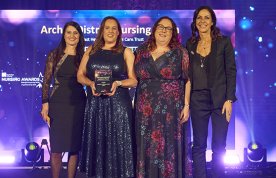
Head of nursing for children and young people Robert Cole and head of nursing for mental health Kevin Ramjeet have significantly improved the experience of the surging number of children, family and carers presenting with mental health problems or behavioural crisis in the acute paediatric unit of the trust’s district general hospital. They recruited a dedicated specialist team to support children and their families and provide therapeutic interventions. Children with eating disorders are better supported, there has been a reduction in episodes of self-harm, and violent incidents and the use of restraint have been reduced. Feedback from parents and carers has been very positive.

Head of nursing for children and young people Robert Cole and head of nursing for mental health Kevin Ramjeet have significantly improved the experience of the surging number of children, family and carers presenting with mental health problems or behavioural crisis in the acute paediatric unit of the trust’s district general hospital. They recruited a dedicated specialist team to support children and their families and provide therapeutic interventions. Children with eating disorders are better supported, there has been a reduction in episodes of self-harm, and violent incidents and the use of restraint have been reduced. Feedback from parents and carers has been very positive.

Carers lead Andrea Hone acted quickly when the National Inpatient Survey showed that her trust had scored below average for considering patients’ home situation and involving patients in discharge decisions. Working with the hospital’s integrated discharge team and Hertfordshire County Council, she started the Connecting with Carers Discharge Project/recruited a Carer Coordinator. Scoping the needs of carers of patients in Watford General Hospital’s frailty unit and what mattered most to them following identification. Following this, carers are supported during a patient’s admission at the hospital, and there are prompt referrals for support as required working alongside the voluntary organisations. Carers received follow-up calls at two and four weeks after discharge to review referrals, check on well-being and to discuss any concerns.


Carers lead Andrea Hone acted quickly when the National Inpatient Survey showed that her trust had scored below average for considering patients’ home situation and involving patients in discharge decisions. Working with the hospital’s integrated discharge team and Hertfordshire County Council, she started the Connecting with Carers Discharge Project/recruited a Carer Coordinator. Scoping the needs of carers of patients in Watford General Hospital’s frailty unit and what mattered most to them following identification. Following this, carers are supported during a patient’s admission at the hospital, and there are prompt referrals for support as required working alongside the voluntary organisations. Carers received follow-up calls at two and four weeks after discharge to review referrals, check on well-being and to discuss any concerns.


This 18-strong team actively seeks out and offers timely support to people of all ages with frailty, recognising that they are at risk of dramatic deterioration in their physical and mental well-being if they further lose their independence. Their integrated approach brings together health and social care providers and community organisations and focuses on the things that matter to people. It enables people to make choices that are right for them by offering coaching, and this ensures changes are more sustainable. Some of those they have supported who were previously considered ‘non-compliant’ have now got jobs, started volunteering roles and reduced their dependency on services.


This 18-strong team actively seeks out and offers timely support to people of all ages with frailty, recognising that they are at risk of dramatic deterioration in their physical and mental well-being if they further lose their independence. Their integrated approach brings together health and social care providers and community organisations and focuses on the things that matter to people. It enables people to make choices that are right for them by offering coaching, and this ensures changes are more sustainable. Some of those they have supported who were previously considered ‘non-compliant’ have now got jobs, started volunteering roles and reduced their dependency on services.


Cancer Research UK senior research nurse and joint lead cancer research nurse at University College London Hospital Jo Hargroves believed her team should share its experience and expertise through an education programme for staff who are new to clinical research. She designed the course’s content, delivery and evaluation. After a pilot for internal staff was a huge success, Ms Hargroves launched the course externally in March 2022, inviting any new staff working across local cancer research networks. In total, 27 speakers delivered a variety of sessions over four days to 69 attendees. Feedback has been positive, and Ms Hargroves now plans to deliver the course biannually, opening registration nationally.


Cancer Research UK senior research nurse and joint lead cancer research nurse at University College London Hospital Jo Hargroves believed her team should share its experience and expertise through an education programme for staff who are new to clinical research. She designed the course’s content, delivery and evaluation. After a pilot for internal staff was a huge success, Ms Hargroves launched the course externally in March 2022, inviting any new staff working across local cancer research networks. In total, 27 speakers delivered a variety of sessions over four days to 69 attendees. Feedback has been positive, and Ms Hargroves now plans to deliver the course biannually, opening registration nationally.


Inspired by the focus on sustainability in the workplace in his home country of the Philippines, Robert Vicente, charge nurse on T8 infection ward at University College London Hospitals NHS Foundation Trust, recognised that his team could reduce the use of disposable items – especially gloves –despite dealing with the most infectious patients in the hospital during a pandemic. He identified instances where the team could avoid the use of disposable gloves and galvanised support from the trust’s infection control team while his team actively promoted excellent hand hygiene with a poster campaign. The ward reduced its use by 36,500 disposable gloves over a four-month period.


Inspired by the focus on sustainability in the workplace in his home country of the Philippines, Robert Vicente, charge nurse on T8 infection ward at University College London Hospitals NHS Foundation Trust, recognised that his team could reduce the use of disposable items – especially gloves –despite dealing with the most infectious patients in the hospital during a pandemic. He identified instances where the team could avoid the use of disposable gloves and galvanised support from the trust’s infection control team while his team actively promoted excellent hand hygiene with a poster campaign. The ward reduced its use by 36,500 disposable gloves over a four-month period.


The burden of headaches on patients, health services and society as a whole is extremely high. Studies show they are underestimated, under-diagnosed and under-treated. To improve patients’ quality of life through effective diagnosis and treatment, advanced nurse practitioner Susie Lagrata has transformed services for patients by being the first nurse in the UK and Europe to complete training and write policies and protocols to increase access to specialised treatments for headaches, such as multiple cranial nerve blocks and botulinum toxin injections. Her work has reduced waiting times from four to six months to 2 weeks, and she has since trained many nurses and doctors in her trust and across the UK.


The burden of headaches on patients, health services and society as a whole is extremely high. Studies show they are underestimated, under-diagnosed and under-treated. To improve patients’ quality of life through effective diagnosis and treatment, advanced nurse practitioner Susie Lagrata has transformed services for patients by being the first nurse in the UK and Europe to complete training and write policies and protocols to increase access to specialised treatments for headaches, such as multiple cranial nerve blocks and botulinum toxin injections. Her work has reduced waiting times from four to six months to 2 weeks, and she has since trained many nurses and doctors in her trust and across the UK.


RCN Nurse of the Year 2022
Social movement Compassionate Inverclyde fosters kindness and compassion in its community driven by director of care at Ardgowan Hospice Alison Bunce. She has held a series of community engagement events generating practical ideas for compassionate citizenship across all the life stages. These ideas became initiatives, such as ensuring nobody dies alone and befriending the vulnerable, which were designed, developed and refined by volunteers, supported initially by Ms Bunce. The inspirational organisation has transformed attitudes and practices addressing social isolation, death and bereavement across Inverclyde encouraging people to help and support each other at times of increased need.


RCN Nurse of the Year 2022
Social movement Compassionate Inverclyde fosters kindness and compassion in its community driven by director of care at Ardgowan Hospice Alison Bunce. She has held a series of community engagement events generating practical ideas for compassionate citizenship across all the life stages. These ideas became initiatives, such as ensuring nobody dies alone and befriending the vulnerable, which were designed, developed and refined by volunteers, supported initially by Ms Bunce. The inspirational organisation has transformed attitudes and practices addressing social isolation, death and bereavement across Inverclyde encouraging people to help and support each other at times of increased need.


Gerard Wainwright has led the Unsafe Swallow Project, which aims to address health inequalities that result in a disproportionately high number of people with learning disabilities dying because of aspiration pneumonia caused by swallowing difficulties. As the project started at the same time as the pandemic, it initially provided webinar-based training to non-nursing services identified as supporting people with learning disabilities at risk of unsafe swallowing. Free video learning resources were developed that have been used by hundreds of people globally. Webinar training has also been delivered to NHS trusts, nurse graduates and other organisations. Services have reported improved confidence of healthcare staff and improved health for the people they care for.

Gerard Wainwright has led the Unsafe Swallow Project, which aims to address health inequalities that result in a disproportionately high number of people with learning disabilities dying because of aspiration pneumonia caused by swallowing difficulties. As the project started at the same time as the pandemic, it initially provided webinar-based training to non-nursing services identified as supporting people with learning disabilities at risk of unsafe swallowing. Free video learning resources were developed that have been used by hundreds of people globally. Webinar training has also been delivered to NHS trusts, nurse graduates and other organisations. Services have reported improved confidence of healthcare staff and improved health for the people they care for.

This team is improving the mental health of young people by talking about animals and their protective behaviours and working with young people to explore their own protective behaviours and what they need to feel mentally safe and well. The programme, co-designed by young people in conjunction with mental health nurses and animal welfare workers, is targeted at young people who struggle to engage in education or one-to-one and group therapies. They receive one-to-one nursing support during sessions but friendships are fostered by working with other young people on practical projects. Completing the programme offers young people recognition of their achievements through accreditation and a bridge to education and job opportunities.


This team is improving the mental health of young people by talking about animals and their protective behaviours and working with young people to explore their own protective behaviours and what they need to feel mentally safe and well. The programme, co-designed by young people in conjunction with mental health nurses and animal welfare workers, is targeted at young people who struggle to engage in education or one-to-one and group therapies. They receive one-to-one nursing support during sessions but friendships are fostered by working with other young people on practical projects. Completing the programme offers young people recognition of their achievements through accreditation and a bridge to education and job opportunities.


Katherine Matthews, manager of Perry Manor Care Home in Worcester, realised people with neurological challenges and mental health needs were being placed out of county which made it difficult to maintain contact with family and loved ones. Determined to provide a local home-from-home alternative, she designed a tailored service. At the 14-person Malvern Suite, each resident from secure psychiatric services receives one-to-one care for at least a month while the team assesses their needs and works to reduce their anxiety and distressed behaviour. As a result, they feel safe and understood, with no need for safety interventions. Since its introduction, the administration of antipsychotic medications and benzodiazepines has halved.


Katherine Matthews, manager of Perry Manor Care Home in Worcester, realised people with neurological challenges and mental health needs were being placed out of county which made it difficult to maintain contact with family and loved ones. Determined to provide a local home-from-home alternative, she designed a tailored service. At the 14-person Malvern Suite, each resident from secure psychiatric services receives one-to-one care for at least a month while the team assesses their needs and works to reduce their anxiety and distressed behaviour. As a result, they feel safe and understood, with no need for safety interventions. Since its introduction, the administration of antipsychotic medications and benzodiazepines has halved.


Mental health nursing student Dave Richens was once addicted to opioid medication after having brain surgery. He overcame this to set up and run the Drink 'n' Drugs initiative, supporting people to overcome addiction, particularly among the homeless and rough sleeping community. His organisation provides signposting to services such as housing and support when applying for benefits. It also issues naloxone emergency kits to those who are at risk of overdosing from opioid-based drugs. It offers support meetings and peer support activities and provides hot meals, drinks, warm clothing, personal hygiene products, sleeping bags and tents to people sleeping rough. It also provides therapies such as hypnotherapy, acupuncture and counselling.


Mental health nursing student Dave Richens was once addicted to opioid medication after having brain surgery. He overcame this to set up and run the Drink 'n' Drugs initiative, supporting people to overcome addiction, particularly among the homeless and rough sleeping community. His organisation provides signposting to services such as housing and support when applying for benefits. It also issues naloxone emergency kits to those who are at risk of overdosing from opioid-based drugs. It offers support meetings and peer support activities and provides hot meals, drinks, warm clothing, personal hygiene products, sleeping bags and tents to people sleeping rough. It also provides therapies such as hypnotherapy, acupuncture and counselling.


Kevin Hale and Dorian Wood have been nominated for their work for reducing loneliness and improving the physical health of scores of people with mental ill-health. Initiatives at their all-inclusive support group include a football group and a walking rugby group for the less fit, which are attended by forensic patients, patients under community teams and those cared for in the private sector. They have linked up with Gwent Dragons rugby club, Mind and have worked hard to raise awareness of the group. They have also secured donated kits from Abergavenny Town football club and have forged links with older adult and learning disability teams.


Kevin Hale and Dorian Wood have been nominated for their work for reducing loneliness and improving the physical health of scores of people with mental ill-health. Initiatives at their all-inclusive support group include a football group and a walking rugby group for the less fit, which are attended by forensic patients, patients under community teams and those cared for in the private sector. They have linked up with Gwent Dragons rugby club, Mind and have worked hard to raise awareness of the group. They have also secured donated kits from Abergavenny Town football club and have forged links with older adult and learning disability teams.


Elizabeth Pepper nominated specialist information and support nurse Sarah Malik for her support in ensuring her husband had a good death. Mrs Pepper says: ‘When my husband wanted to write an advance decision statement, I could only cry. Sarah gently and empathetically reassured and guided us, patiently answering our questions and helping us arrive at a consensus, sharing vital information about what happens in death with enormous sensitivity. My husband got his advance decision and I could recognise that I was empowering him. Without it, we wouldn’t have been able to resist the pressure to send him to hospital at the end of his life. He was able to die at home.’

Elizabeth Pepper nominated specialist information and support nurse Sarah Malik for her support in ensuring her husband had a good death. Mrs Pepper says: ‘When my husband wanted to write an advance decision statement, I could only cry. Sarah gently and empathetically reassured and guided us, patiently answering our questions and helping us arrive at a consensus, sharing vital information about what happens in death with enormous sensitivity. My husband got his advance decision and I could recognise that I was empowering him. Without it, we wouldn’t have been able to resist the pressure to send him to hospital at the end of his life. He was able to die at home.’

In recovery from cancer, Macmillan nurse Emma Harnett and patient panel lead Ann Nutt joined forces with patient engagement expert Shahid Sardar to promote the patient voice in cancer care and improve services. Now a team of ten, One Step at a Time Supporting the Cancer Journey produces non-clinical information by patients for patients. There are videos, translated into Romanian, Polish, Punjabi, Urdu and Italian, by survivors and carers, and a non-clinical patient pocket guide. The information is given to patients at diagnosis and is now part of the cancer campaign strategy.


In recovery from cancer, Macmillan nurse Emma Harnett and patient panel lead Ann Nutt joined forces with patient engagement expert Shahid Sardar to promote the patient voice in cancer care and improve services. Now a team of ten, One Step at a Time Supporting the Cancer Journey produces non-clinical information by patients for patients. There are videos, translated into Romanian, Polish, Punjabi, Urdu and Italian, by survivors and carers, and a non-clinical patient pocket guide. The information is given to patients at diagnosis and is now part of the cancer campaign strategy.




